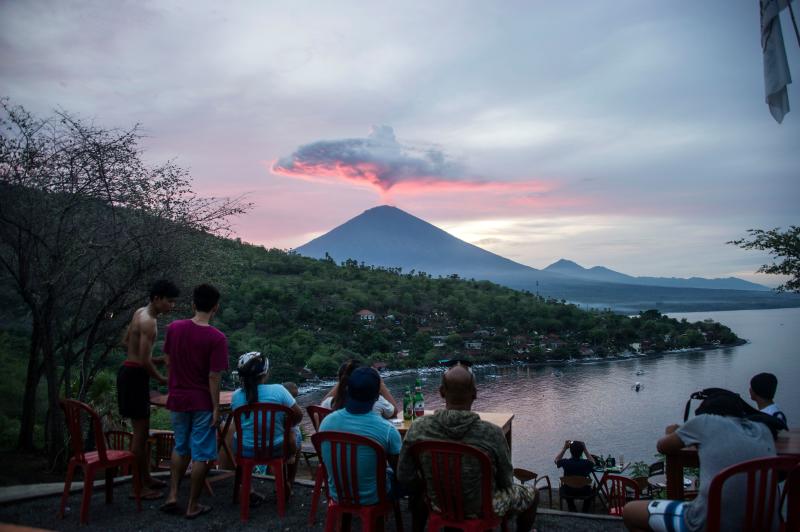Bali's rumbling volcano leaves tourist industry gasping for air
Sign up now: Get insights on Asia's fast-moving developments

Tourists gather to watch Mount Agung at Amed beach in Karangasem on Indonesia's resort island of Bali on Nov 30, 2017.
PHOTO: AFP
UBUD, INDONESIA (NYTIMES) - His taxi was parked nearby, but Wayan Yanjun was sitting on the sidewalk along the main street in Ubud on the resort island of Bali. It might be some time before anyone needed a ride: He'd had only three passengers in the past week, he said, ever since the eruption of Mount Agung, in Bali's northeast.
The volcano sent huge plumes of ash into the air for two days last week, temporarily closing the island's Ngurah Rai International Airport. The volcano has since calmed down, at least outwardly, and the airport has reopened. But Ubud, a popular destination about 30km southwest of the volcano, has seen a sharp drop in visitors, as has much of the rest of Bali, Indonesia's top tourism spot.
"Business is super bad at the moment," said Yanjun, 35, who has been driving a taxi for seven years. "It is a very uncertain situation for us now." Scientists who are monitoring Mount Agung say the volcano could erupt again at any time. The government has ordered the evacuation of about 100,000 people who live within 10km of the summit.
While nearly all of Bali's resort hotels and tourist attractions are well outside the danger zone, uncertainty over future eruptions and possible airport closings has prompted many travellers to cancel planned trips to Bali or avoid it altogether.
Tjokorda Oka Artha Ardhana Sukawati, head of Bali's hotel and restaurant association, said that the island's hotel occupancy rate is now at 20 per cent, compared with 60 per cent this time last year.
Bali's normally crowded beaches had only a handful of visitors on Thursday (Dec 7), and hotels were offering steep discounts to lure travellers back.
That does not bode well for the tourism outlook as the island heads into what would normally be a busy holiday season.
"Uncertainty is as much an enemy to the regional tourism industry as the actual eruptions," said Keith Loveard, a senior analyst at the Jakarta-based firm Concord Consulting.
Also affected is the neighbouring island of Lombok, an increasingly popular tourist destination. Its airport has also been forced to close at times because of volcanic ash in the air, which can damage an airplane's engine.
Arief Yahya, Indonesia's minister of tourism, said last week that Bali would lose about US$665 million (S$897 million) through the end of November because of the volcanic activity, which started increasing noticeably in September.
Indonesia is unlikely to make its target of 15 million visitors this year, he said. The country's goal of 20 million visitors by 2019 is also in jeopardy.
Ubud, a picturesque town in the foothills, is surrounded by rice paddies and is popular with foreign tourists. On a clear day, Mount Agung is visible from some parts of town.
The town centre is full of art galleries, clothing stores, coffee shops, spas and yoga studios. Normally, the main street is choked with traffic and its sidewalks crowded with pedestrians.
But now, Ubud's hotels and shops have few customers and the streets are uncharacteristically devoid of traffic. Tour buses, typically ubiquitous, have vanished.
Sales clerks, waiters and spa workers sit in front of their empty establishments, chatting with each other and offering their services to the occasional tourist who walks by.
Many worry whether they will be able to keep their jobs.
"This is the quietest I have ever seen Ubud," said Dewa Septiana, 25, a barista at a coffee shop. "Usually this street will be full of traffic. But since the airport closing last week, it has been empty here. Very empty." I Made Gunarta, 53, who operates the Yoga Barn, a yoga studio and guesthouse, said that his yoga classes typically attract 50 students but now have only 20. The guesthouse usually has 80 per cent occupancy but is now only half full.
He is concerned that he may not be able to keep all of his 250 employees.
"The impact of the eruption is very huge," he said. "This definitely will hit the economy. The people who will be affected most by this situation are the people with the lowest income." Some Balinese compare the current downturn to the aftermath of the 2002 Bali bombing, when Islamic extremists blew up a popular nightclub in Kuta and killed 202 people, mostly foreign tourists.
The island's tourist industry took years to recover and then suffered another setback in 2005 with restaurant bombings that killed 20 people. It took another year for the tourist industry to bounce back from that.
Desak Putri, 44, who sells knickknacks at the popular Ubud Market, said she used to take in more than US$200 a day but now is lucky if she sells US$15 worth of merchandise. On one recent day, she sold nothing.
"Even after the Bali bombing, it wasn't this quiet," she said.
Tourists who have made it to Ubud, on the other hand, are taking advantage of the tranquillity - even if they feel a bit guilty.
Two visitors from Britain, Steph Sorum, 27, and Alex Jones, 29, who are on their way home after working in New Zealand for two years, liked Ubud so much that they extended their stay.
Sites that they expected to be overrun with tourists have turned out to be surprisingly peaceful, they said.
"In our selfishness, we enjoy it," Sorum said.
Jones added: "It is devastating for the locals though. I mean if you walk by the street, and you know the guys offering taxis are desperate. I really feel sorry for them."


